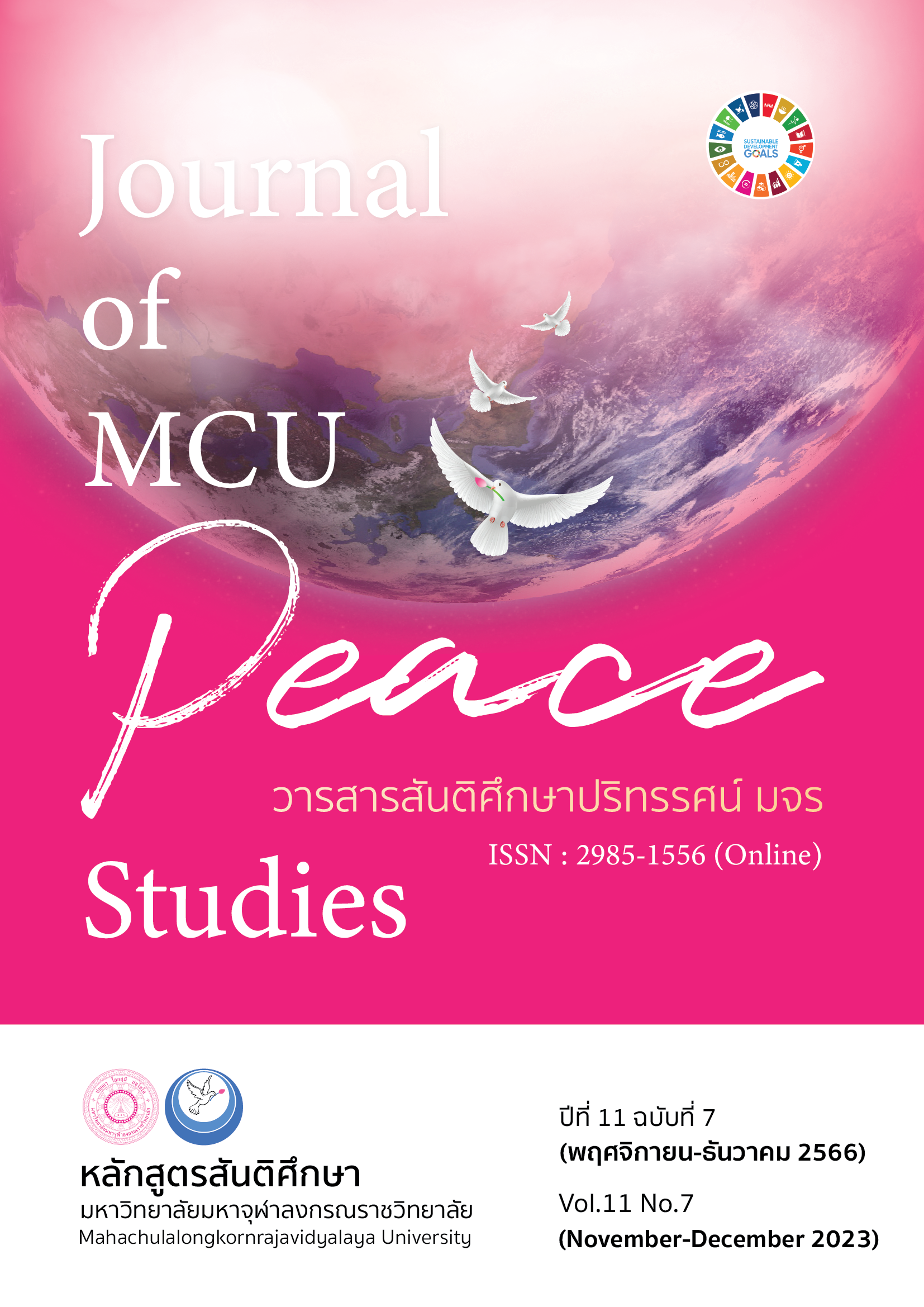การพัฒนารูปแบบการจัดการเรียนรู้เพื่อส่งเสริมความสามารถในการเขียนเชิงสร้างสรรค์ของนักเรียนระดับชั้นมัธยมศึกษาปีที่ 6
Main Article Content
บทคัดย่อ
การวิจัยและพัฒนานี้มีวัตถุประสงค์เพื่อ 1. ศึกษาข้อมูลพื้นฐานในการพัฒนารูปแบบการจัดการเรียนรู้ 2. พัฒนารูปแบบการจัดการเรียนรู้ และ 3. ทดลองใช้และศึกษาผลของการใช้รูปแบบการจัดการเรียนรู้ ดำเนินการวิจัย 4 ระยะ คือ ระยะที่ 1 ศึกษาข้อมูลพื้นฐานในการพัฒนารูปแบบ กลุ่มตัวอย่างเป็นครูผู้สอนรายวิชาภาษาไทยพื้นฐาน ระดับชั้นมัธยมศึกษาปีที่ 6 จำนวน 85 คน และผู้เชี่ยวชาญด้านการเขียนเชิงสร้างสรรค์ จำนวน 5 คน โดยการเลือกแบบเจาะจง เครื่องมือที่ใช้ คือ 1) แบบสอบถามความต้องการจำเป็น 2) แบบสัมภาษณ์ ระยะที่ 2 พัฒนารูปแบบและประเมินความเหมาะสมของรูปแบบโดยผู้เชี่ยวชาญ เครื่องมือที่ใช้ คือ แบบประเมินความเหมาะสมของรูปแบบการจัดการเรียนรู้ ระยะที่ 3 ทดลองใช้รูปแบบ กลุ่มตัวอย่างที่ใช้ คือ นักเรียนชั้นมัธยมศึกษาปีที่ 6 รวม 62 คน ได้มาโดยการสุ่มแบบหลายขั้นตอน เครื่องมือที่ใช้ คือ 1) รูปแบบการจัดการเรียนรู้ 2) คู่มือการใช้รูปแบบ 3) แผนจัดการเรียนรู้ 4) แบบทดสอบความรู้ความเข้าใจ และ 5) แบบวัดความสามารถในการเขียนเชิงสร้างสรรค์ ระยะที่ 4 การปรับปรุงรูปแบบใช้ตัวอย่างเดียวกันกับระยะที่ 3 เครื่องมือที่ใช้ คือ แบบสอบถามความพึงพอใจต่อรูปแบบการจัดการเรียนรู้ วิเคราะห์ข้อมูลด้วยสถิติบรรยาย ดัชนีลำดับความสำคัญของความต้องการจำเป็นแบบปรับแก้ การทดสอบที และวิเคราะห์ความแปรปรวนร่วมพหุคูณแบบทางเดียว
ผลการวิจัยพบว่า 1. ลำดับความสำคัญของความต้องการจำเป็นที่มากที่สุด คือ ด้านการพัฒนาความสามารถในการเขียนเชิงสร้างสรรค์ของนักเรียน โดยหลักสำคัญที่เป็นแนวทางในการพัฒนาความสามารถในการเขียนเชิงสร้างสรรค์ประเภทการแต่งคำประพันธ์ คือ 1) ความรู้ความเข้าใจในฉันทลักษณ์ 2) ความถูกต้องของเนื้อหา 3) ความงามทางวรรณศิลป์ และ 4) คุณค่าและประโยชน์ต่อเพื่อนมนุษย์ 2. รูปแบบ การจัดการเรียนรู้ที่พัฒนาขึ้น ชื่อ “S4CA Model” มี 5 องค์ประกอบ คือ 1) หลักการ 2) วัตถุประสงค์ 3) สาระการเรียนรู้ 4) กระบวนการจัดการเรียนรู้ แบบ 6 ขั้นตอน คือ ขั้น 1 จุดประกายกระตุ้นคิด ขั้น 2 ชวนพินิจความรู้ใหม่ ขั้น 3 ร่วมใจกลุ่มสัมพันธ์ ขั้น 4 มุ่งมั่นสู่หลักการ ขั้น 5 เขียนผลงานอย่างสร้างสรรค์ และขั้น 6 ร่วมกันประเมินผล และ 5) การวัดและประเมินผลการใช้รูปแบบการจัดการเรียนรู้ 3. ผลการทดลองใช้รูปแบบพบว่า 1) นักเรียนกลุ่มทดลองมีความสามารถในการเขียนเชิงสร้างสรรค์หลังเรียนสูงกว่าก่อนเรียนอย่างมีนัยสำคัญทางสถิติที่ระดับ 0.05 2) นักเรียนกลุ่มทดลองมีความสามารถในการเขียนเชิงสร้างสรรค์ หลังเรียนสูงกว่านักเรียนกลุ่มควบคุมอย่างมีนัยสำคัญทางสถิติที่ระดับ 0.05 และ 3) นักเรียนมีความพึงพอใจต่อรูปแบบการจัดการเรียนรู้ในภาพรวมอยู่ในระดับมาก ( = 4.07, S.D. = 0.68)
Article Details

อนุญาตภายใต้เงื่อนไข Creative Commons Attribution-NonCommercial-NoDerivatives 4.0 International License.
ทัศนะและความคิดเห็นที่ปรากฏในบทความในวารสาร ถือเป็นความรับผิดชอบของผู้เขียนบทความนั้น และไม่ถือเป็นทัศนะและความรับผิดชอบของกองบรรณาธิการ ยินยอมว่าบทความเป็นลิขสิทธิ์ของวารสาร
เอกสารอ้างอิง
Aekakul, T. (2018). Research Methodology. (3rd ed.). Ubon Ratchathani: Wittaya Printing.
Aiemkongsri, S. (2018). Classroom Management in the 21st Century. Bangkok: Triple Education.
Bandura, A. (1977). Self-efficacy: Toward a Unifying Theory of Behavior. Psychological Review, 84(2), 191-215.
Bandura, A., Barbaranelli, C., Caprara, G. V., & Pastorelli, C. (1996). Multifaceted Impact of Self-efficacy Beliefs on Academic Functioning. Child Development, 67(3), 1206-1222.
Bowornwattanaset, C. (2016). Instructional Development of Teachers Through Constructivist Classroom. Prae-wa Kalasin Journal of Kalasin University, 3(1), 147-169.
Buranasinvattanakul, K. (2016). The Development of Learning Model Using Plsek’s Creative Thinking Process and Sternberg’s Triarchis Theory of Human Intelligence to Enhance Creative Narrative Writing Abilities of Undergraduate Students. (Doctoral Dissertation). Silpakorn University. Nakhon Pathom.
Chareonwongsak, K. (2010). Creative Thinking. (2nd ed.). Bangkok: Success Media.
Jivapan, A. (2018). Creative Writing Activities for Elementary Students. (13th ed.). Bangkok: Chulalongkorn University Press.
Kalomcharoen, M. (2016). Using Creative Writing Activities with Scaffolding to Promote the Creative Writing of Sixth Grade Students in Bangkok Metropolis. (Master’s Thesis). Chulalongkorn University. Bangkok.
Khammanee, T. (2009). Science of Teaching: Knowledge for Effective Learning Management. (21st ed.). Bangkok: Chulalongkorn University Press.
Lapho, J. (2019). Development of Instructional Model for Teaching Creative Writing Course for Thai Language Teachers Based on Brain-based Learning Integrated with Synectics Strategy for Undergraduate Students in Thai Program. (Doctoral Dissertation). Sakon Nakhon Rajabhat University. Sakon Nakhon.
Office of the Education Council. (2007). Constructivism Instruction. Bangkok: The Agricultural Co-operative Federation of Thailand.
Office of the Education Council. (2017). Research and Development of Competency-based Curriculum and Instruction Accordance with the National Qualifications Framework. Bangkok: Prikwarn Graphic.
Pohtong, K. (2014). Development of An Instructional Model Based on Transtextuality Theory to Enhance Creative Reading and Creative Writing Ability of Undergraduate Students. (Doctoral Dissertation). Silpakorn University. Nakhon Pathom.
Praseeratesung, R. (2015). The Development of Learning Model Based on Constructivism by Creative Problem Solving for High School Students. (Doctoral Dissertation). Mahasarakham University. Mahasarakham.
Samrongthapwittayakom School. (2020). School Self-assessment Report 2020. Surin: Samrongthapwittayakom School.
Sangkharat, T. (2015). Enhancing Undergraduate Students’ Ability in Writing Thai Essays Through and Instructional Model Developed by Using Transfer of Learning and Social Cognitive Theory. (Doctoral Dissertation). Silpakorn University. Nakhon Pathom.
Sema, T. (2017). The Development of Learning Management Model to Enhance Creative Writing of Higher Vocational Certificate Students. (Doctoral Dissertation). Mahasarakham University. Mahasarakham.
Suwannarong, C. (2013). Thai Poetry Features. (5th ed.). Sakon Nakhorn: Sakon Nakhon Printing.
Taamat, P. (2016). Development of a Model of Teaching Thai Creative Writing Using the Strategy of Scaffolding with Writing Experience for 4th Grade Students. (Doctoral Dissertation). Mahasarakham Rajabhat University. Mahasarakham.
Wajanasatian, C. (2016). The Development of Creative Writing Ability for Grade 3rd Student Taught by Using Synectics Model. (Master’s Thesis). Silpakorn University. Nakhon Pathom.
Wiboolyasarin, W. (2013). Development of a Blended Instructional Model Based on Participatory Communication Approach Using Round Table Writing Technique on Social Media to Enhance Creative Criticism Writing Ability for Undergraduate Students. (Doctoral Dissertation). Chulalongkorn University. Bangkok.
Wongwanich, S. (2019). Need Assessment Research. (4th ed.). Bangkok: Chulalongkorn University Press.


